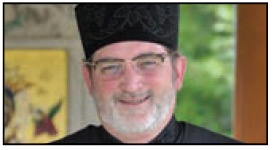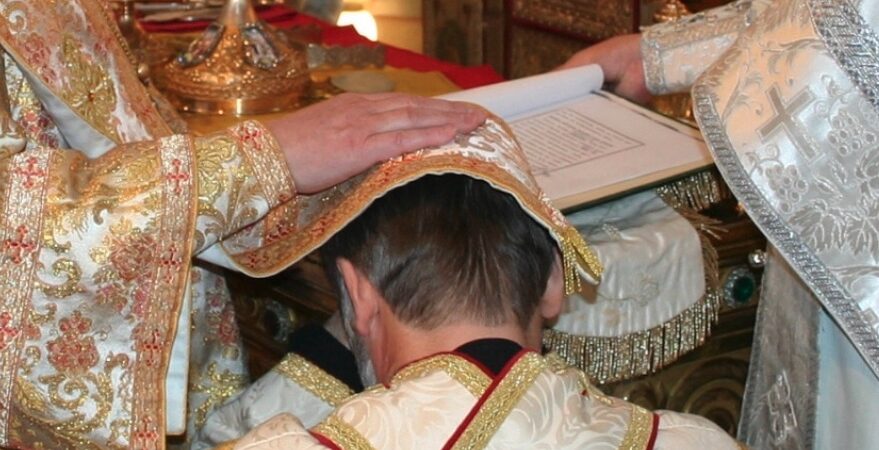Divine Grace and the Diaconate
Examining three pieces of prayer in the ordination rite
Father Daniel Dozier Comments Off on Divine Grace and the Diaconate
 In the Byzantine ordination rite of a deacon, the bishop places his omophorion (stole) and his right hand on his head and offers the following prayer: “Divine grace, which always cures the infirm and supplies what is wanting, ordains the devout subdeacon N., to the diaconate; therefore, let us pray for him that the grace of the most Holy Spirit may descend upon him.”
In the Byzantine ordination rite of a deacon, the bishop places his omophorion (stole) and his right hand on his head and offers the following prayer: “Divine grace, which always cures the infirm and supplies what is wanting, ordains the devout subdeacon N., to the diaconate; therefore, let us pray for him that the grace of the most Holy Spirit may descend upon him.”
This prayer constitutes the moment the grace of ordination is poured out, transforming the subdeacon to a deacon. Three things are noteworthy about the words of this prayer.
First, we note that the focus of the prayer is on divine grace (charis) as the principal force, or power, which ordains or consecrates this particular man as a deacon of the Church.
The grace of God is defined as God’s special gift or glorious power of his own life and love freely bestowed upon human persons. The grace that comes from God reflects a supernatural vocation of humanity to know, love and praise the Most Holy Trinity and to share in the transformative energies (energia) of God beyond what we possess in our created nature. God especially gives grace through the seven sacramental mysteries of the Church. Along with crowning in matrimony, holy orders falls within the Mysteries of Service, where the kingdom of God is established and cultivated in the vineyard of the home and the Church. Most permanent deacons receive the grace of both of these mysteries.
Second, we note in the prayer of the bishop what divine grace does — it “always cures the infirm” and “supplies what is wanting.” Here it is good to reflect on these words.
In the Byzantine tradition, this prayer is frequently prayed: “Most Holy Trinity, have mercy on us. O Lord, cleanse us of our sins. O Master, pardon our transgressions. O Holy One, come to us and heal our infirmities for the sake of your name.” This Trinitarian prayer explicitly mentions three classifications of faults that we as human beings possess:
• Sins reflect the acts of intentional disobedience to God and his word.
• Transgressions are the flaws and bad habits that cause harm to ourselves and others and which are generally unintended.
• Infirmities are the passions of Adam that we inherited and incline us toward sin and death, away from paradise and life with God. In the West, this is known as concupiscence.
The ordination rite makes reference to these infirmities with the phrase “curing the infirm,” because all men have to deal with the weaknesses of the Adamic passions and the inclination to sin. Divine grace bestowed in ordination is a source of healing from these debilitating passions so that — if we cooperate with this grace — we are more and more formed in the image of the New Adam.
This second part of the prayer speaks of the power of grace to empower the ordinand with charisms to perform the office for which he is being ordained. This second part of the prayer is likely more of what we associate with the grace of ordination since it reminds us of the words of Jesus to his disciples from Acts 1:8: “You will receive power when the holy Spirit comes upon you, and you will be my witnesses in Jerusalem.” Here we think about the supernatural and extraordinary graces that are poured out in support of the three munera of the diaconate: Word, worship and charity. What we lack in natural ability, God supplies for the missionary task.
Third and finally, what is the source of this grace? The words of the prayer are explicit: “that the grace of the most Holy Spirit may descend upon him.” This descent of the Holy Spirit in grace is renewed symbolically every time a deacon vests for the liturgy.
FATHER DANIEL DOZIER is co-founder and chief learning officer for The Center for InMinistry Development and an associate professor of Scripture and Catholic leadership, www.inministrydevelopment.com.





